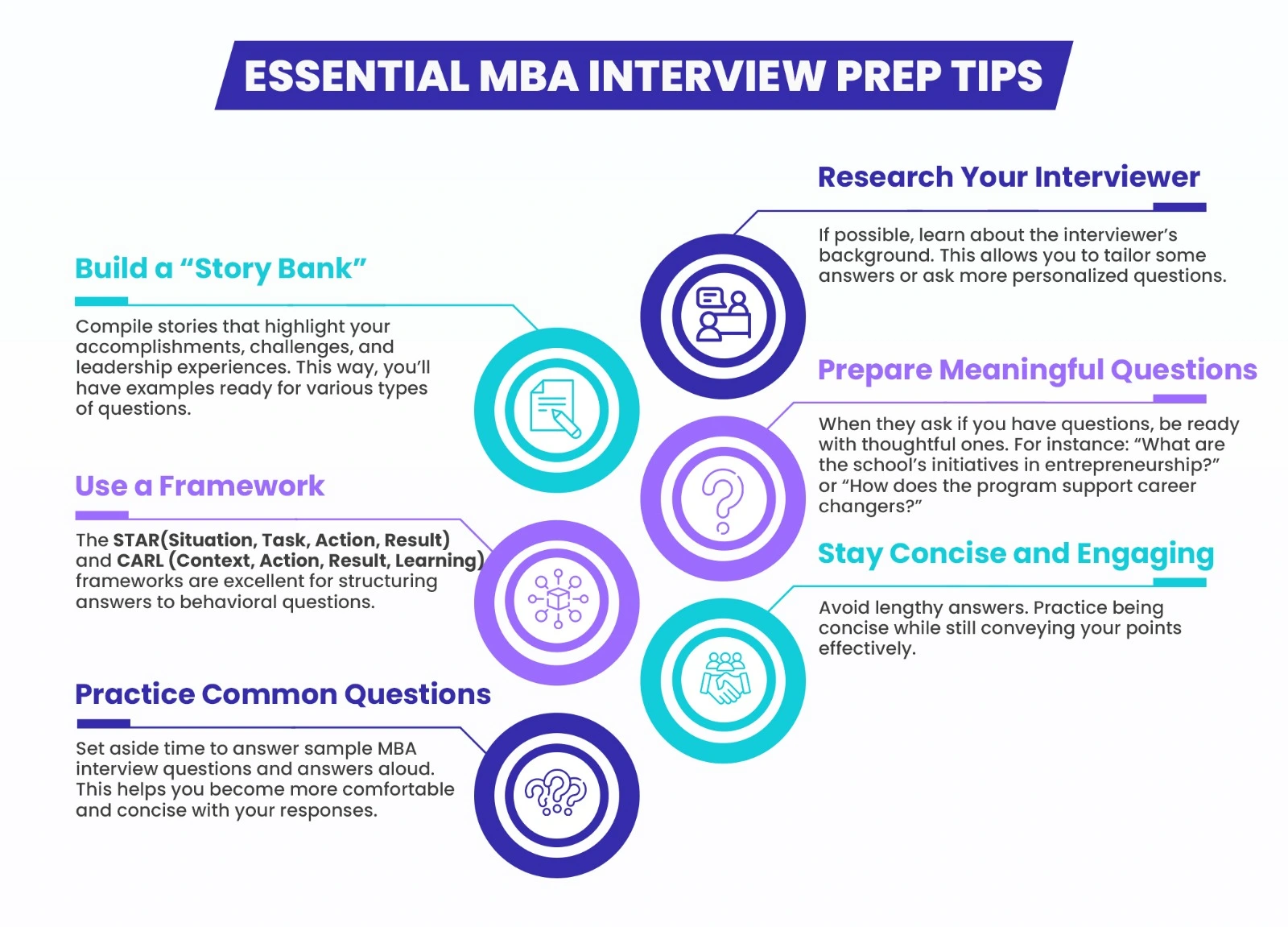You’ve invested time and effort into your MBA application, and now you’re one step closer to securing your spot in a prestigious program.
But how do you ensure you make the best impression? In this blog, we’ll break down the essentials of MBA interview prep to answer all the doubts and questions that aspirants like you often have.
We’ll cover common MBA interview questions, tips on crafting memorable answers, and even explore some lesser-known aspects that can set you apart. Let’s dive into everything you need to know to ace your MBA interview.
Why Is MBA Interview Preparation Important?
The MBA interview is more than just a formal step; it’s an opportunity for admissions committees to understand you beyond your application. They want to know if you’ll be a good fit for their program, your career aspirations, and what unique perspectives you bring. Your preparation will determine how confidently and articulately you present yourself and how well you showcase the skills and experiences that make you an ideal candidate.
Types of MBA Interviews
Understanding the interview types will help you tailor your preparation. Here’s a breakdown of the most common formats:
| Interview Tips | Descripción | Common Questions | Propósito |
| One-on-One Interview | Conducted by an admissions officer or alumnus. Mix of personal and professional questions. | “Walk me through your resume.” “Why MBA now?” | Assess career trajectory, motivation, and program fit. |
| Panel Interview | Multiple interviewers, including faculty or alumni. | “Describe a time you led a team.” “How do you handle conflict?” | Evaluate teamwork, leadership, and pressure-handling skills. |
| Behavioral Interview | STAR (Situation, Task, Action, Result) method. | “Describe a challenge you faced.” “Give a leadership example.” | Understand problem-solving and leadership capabilities. |
| Group Interview | Group exercise with other candidates. | “Propose a strategy for this scenario.” | Observe teamwork, collaboration, and interpersonal skills. |
| Video Interview (Kira) | Pre-recorded questions, video responses. | “What are your strengths?” “How will you contribute to our program?” | Assess virtual communication skills and program motivation. |
| Blind Interview | Interviewer has no prior information about you. | “Tell me about yourself.” “What are your long-term goals?” | Gauge spontaneity, clarity, and self-awareness. |
Top 20 MBA Interview Questions and How to Answer Them
Here’s a list of the top 20 questions in master’s admission interviews and strategies for answering them effectively. Remember, these are only guidelines; tailor your answers to reflect your unique experiences and personality.
- Tell me about yourself.
- Start with your background, major accomplishments, and motivation for an MBA. Use this as a brief “elevator pitch” that flows naturally.
- Why do you want to pursue an MBA?
- Focus on your career goals, what gaps the MBA will fill, and why it’s the right time.
- Why this business school?
- Research specific program details and relate them to your career aspirations. Show that you’ve done your homework on what sets this school apart.
- What are your short-term and long-term career goals?
- Be specific about your post-MBA job goals and how they align with your long-term career vision.
- Describe a leadership experience.
- Use the STAR framework to outline the situation, your task, actions taken, and the results achieved.
- What are your strengths and weaknesses?
- Share a genuine strength with a relevant example. For weaknesses, choose one that you’ve worked to improve.
- How do you handle conflict?
- Provide an example showing your ability to mediate, empathize, and find solutions under challenging circumstances.
- Describe a time you failed.
- Discuss what went wrong, what you learned, and how it’s helped you grow.
- What makes you unique?
- Highlight an aspect of your background or experience that sets you apart from other applicants.
- What will you contribute to our program?
- Mention your skills, experiences, and specific interests that align with the school’s culture and mission.
- How do you manage stress?
- Share your methods for staying calm and focused, particularly in high-stakes situations.
- Do you have any questions for us?
- Questions to ask interviewer MBA: “What sets your program apart from others?” “How does the school support career development in X industry?”
- Describe a successful team project you led.
- Detail how you managed the team, delegated tasks, and led it to success.
- What motivates you?
- Share what drives you professionally and personally, ideally connecting it to your decision to pursue an MBA.
- How do you handle criticism?
- Describe a time you received feedback and how you used it constructively.
- What is your greatest achievement?
- Pick an achievement that shows resilience, creativity, or leadership.
- How do you stay updated with industry trends?
- Mention specific resources, publications, or networks that help you stay informed.
- Why should we admit you?
- Sum up your strengths, how you’ll contribute to the program, and your alignment with its values.
- What other schools are you considering?
- Be honest, but show why this school is your top choice.
- Where do you see yourself in 10 years?
- Outline your long-term career vision, with the MBA as a stepping stone.
Essential MBA Interview Prep Tips

1. Build a “Story Bank”
Compile stories that highlight your accomplishments, challenges, and leadership experiences. This way, you’ll have examples ready for various types of questions.
2. Use a Framework
The STAR (Situation, Task, Action, Result) and CARL (Context, Action, Result, Learning) frameworks are excellent for structuring answers to behavioral questions.
3. Practice Common Questions
Set aside time to answer sample MBA interview questions and answers aloud. This helps you become more comfortable and concise with your responses.
4. Research Your Interviewer
If possible, learn about the interviewer’s background. This allows you to tailor some answers or ask more personalized questions.
5. Prepare Meaningful Questions
When they ask if you have questions, be ready with thoughtful ones. For instance: “What are the school’s initiatives in entrepreneurship?” or “How does the program support career changers?”
6. Stay Concise and Engaging
Avoid lengthy answers. Practice being concise while still conveying your points effectively.
Common Mistakes to Avoid Preparing For MBA Interview
- Over-preparing answers to the point of sounding scripted.
- Not knowing specific details about the program.
- Rambling answers – keep responses focused.
- Failing to practice answering questions aloud.
- Forgetting to showcase your personality – schools want well-rounded individuals.
Good Questions to Ask MBA Admissions Officers
Your interview should be a two-way conversation. Prepare some thoughtful questions to ask the interviewer MBA—this demonstrates genuine interest and engagement. Here are a few good questions to ask MBA admissions officers:
- “What qualities make a student stand out in this program?”
- “How does the program support career development and networking?”
Asking these questions shows that you’re well-prepared and invested in your future at the school. It also helps you gauge whether the program meets your own needs and expectations.
Bonus Tips for a Successful Interview From MBA House
After all the hard work on your resume, essays, and applications, the interview is the next big hurdle to tackle.
Getting an interview invite from a business school is a big deal!
Here’s a quick guide from MBA House to help you put your best foot forward and leave a lasting impression.
1. Know Your Resume Inside Out
Be ready to talk about your top accomplishments and have stories to back them up. These experiences are your best selling points, so prepare to share them confidently. Remember, your interviewer might ask about any part of your resume, so be familiar with all the details and ready to discuss them naturally.
2. Do Your Homework
Walking in prepared makes all the difference. Take time to understand the interview structure and anticipate some likely questions. Get familiar with the program and, if possible, chat with current students or alumni who can share what to expect. Knowing the ins and outs of the school will give you an edge.
3. Practice Makes Perfect
Practicing MBA interview questions can really boost your confidence. Look up sample questions online, or better yet, ask a friend to play the role of the interviewer. The more you practice, the more comfortable you’ll feel when the big day arrives.
4. Ask Smart Questions
Think about the questions you’ll ask in advance. Avoid questions that you can answer with a quick glance at the school’s website. Instead, try to ask meaningful, specific questions. If you know your interviewer’s background, consider asking about their own experiences or career journey. Thoughtful questions show you’re genuinely interested.
5. Know the Program Well
Make sure you have a solid understanding of the program. Take a look at the school’s website, social media, and, if possible, visit the campus to get a feel for its culture. Being knowledgeable about the school’s values and strengths shows admissions that you’re serious about finding the right fit.
6. Clarify Your MBA Goals
Think about why you want this MBA and how it fits into your career journey. Share stories about key career moves, and be clear about where you’re heading next. Show that you have a vision and a plan, connecting your past experiences to your future ambitions.
7. Treat the Interview with Professionalism
Even if the interview is virtual, dress appropriately and maintain good eye contact. The setting might be different, but the impression you leave matters just as much. Confidence and professionalism go a long way.
8. Prepare for Different Interview Styles
Each school might have its own interview style, and you may face different types of interviewers. Sometimes, you’ll meet with alumni, or you might have a group interview. Be ready for anything, and don’t let unexpected formats throw you off.
9. Be Consistent with Your Application
Keep your answers aligned with what you’ve written in your application. Consistency builds credibility, so avoid any contradictions between what you say and what’s on your resume or essays.
10. Follow Up Thoughtfully
A thank-you note goes a long way. After the interview, take a moment to thank your interviewer, and if any alumni or professors helped you along the way, send them a note as well. It’s a simple gesture that leaves a positive impression.
Before You Go… There’s more…
The MBA interview is your chance to showcase your personality, goals, and potential beyond what’s on paper. With the right preparation, confidence, and a clear sense of your unique strengths, you can make a lasting impression on admissions committees. By understanding common business school interview questions, thoughtfully crafting your responses, and preparing insightful questions of your own, you’ll walk into the interview room feeling ready to succeed. Remember, it’s not just about answering questions; it’s about engaging in a conversation that highlights why you’re the perfect fit for their program.
At MBA House, we’re here to support you in reaching this next milestone. Our Ivy League-trained Tutors and Consultants have guided over 2,000 students in securing admissions to top MBA programs globally, with over $50 million awarded in scholarships. Whether you need unlimited private tutoring, live classes, or comprehensive e-learning support, MBA House provides the resources and expertise to help you fast-track your journey to business school.
Connect with us today at [email protected], and let’s maximize your chances of MBA admission success!
Preguntas frecuentes
How to practice for an MBA interview?
Practice by answering questions aloud, recording yourself, or scheduling a mock interview with a mentor or coach to get real-time feedback.
Is an MBA interview difficult?
It can be challenging, but with the right preparation, you can feel confident. The difficulty varies by school and the interviewer’s approach.
What to expect at an MBA interview?
Expect questions on your career, leadership, and motivation. You may also discuss your fit with the program and face behavioral questions.
Hardest MBA Interview Questions—and How to Answer
Questions about weaknesses, failures, and long-term goals are often challenging. Be honest, and structured, and keep answers constructive.





Redes sociales